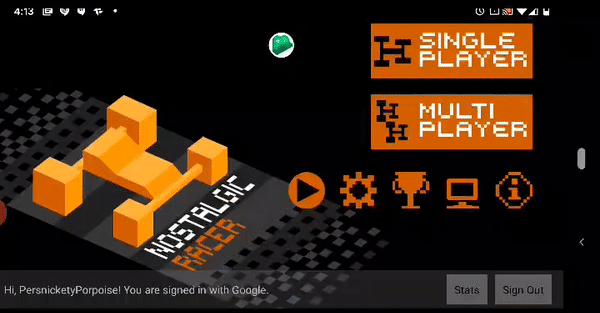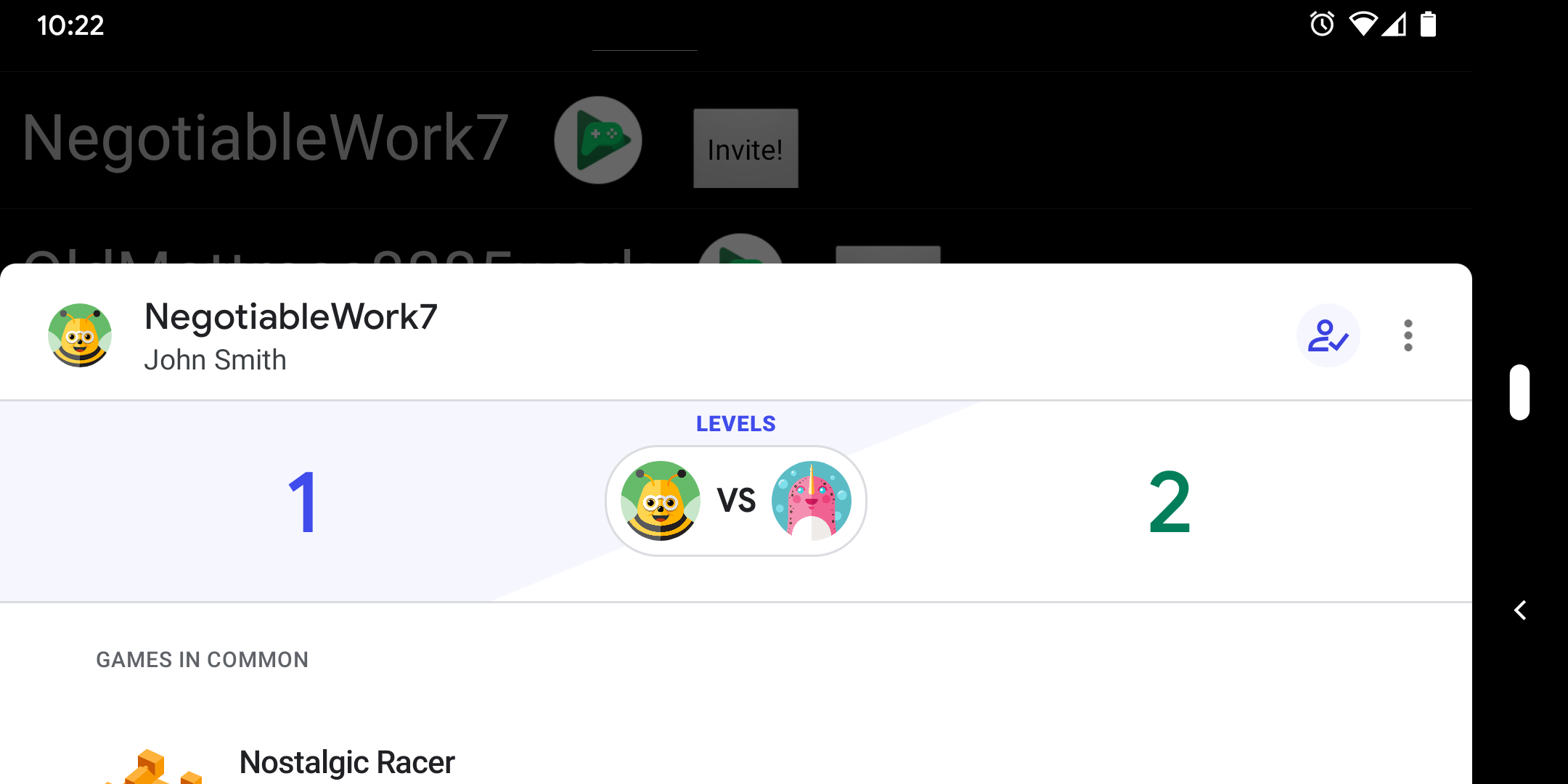استخدِم واجهات برمجة التطبيقات الخاصة بالأصدقاء لتكميل نظام الأصدقاء الحالي في اللعبة وتحسينه وأنظمة التواصل الاجتماعي الأخرى التي قد تصل إليها لعبتك. يتيح لك ذلك أن تسمح للاعبين بما يلي:
العثور على أصدقائهم في لعبتك
مقارنة النتائج مع الأصدقاء على لوحات الصدارة
دمج قائمة الأصدقاء في "ألعاب Play" مع قوائم الأصدقاء الحالية داخل اللعبة
تحديد لاعب آخر من خلال نافذة منبثقة خاصة بالملف الشخصي داخل اللعبة تعرض هذه النافذة المنبثقة لقبًا أطلقه اللاعب الحالي على صديقه، ليعرف من يلعب معه.

الأساسيات
تتيح لك واجهات برمجة التطبيقات هذه تنفيذ الإجراءات التالية:
- تحميل الأصدقاء: يمكنك معرفة ما إذا كان اللاعب قد سمح للعبة بالوصول إلى معلومات قائمة الأصدقاء. في حال منح الإذن، يمكنك الحصول على قائمة بعناصر Player تتضمّن أصدقاء اللاعب الذي تم إثبات هويته.
- إطلاق عرض لملف لاعب آخر على "ألعاب Play": يمكنك فتح هذا العرض لإظهار الاسم الذي منحه اللاعب الذي تم إثبات هويته للاعب الآخر. توفّر طريقة العرض هذه أيضًا عناصر تحكّم في إدارة الصداقات، ولن تؤدي إلى إخراج اللاعب من لعبتك.
- توفير عناصر تحكّم للمستخدمين: يوفّر المستخدم عناصر تحكّم لإدارة طريقة ظهور ملفه الشخصي على "ألعاب Play" للأصدقاء وطريقة ظهور قائمة أصدقائه للألعاب. بالنسبة إلى إذن الوصول إلى قائمة الأصدقاء، يمكن للمستخدم اختيار منح الإذن تلقائيًا لجميع الألعاب أو الموافقة على منح الإذن لكل لعبة على حدة. نتيجةً لذلك، عند تحميل قائمة الأصدقاء، قد تكون النتيجة عبارة عن دالة ردّ لعرض طلب الوصول.
استيراد قائمة أصدقاء في "ألعاب Play"
يمكنك استخدام واجهات برمجة التطبيقات الخاصة بالأصدقاء للحصول على قائمة بأصدقاء اللاعبين على "ألعاب Play" وإضافتهم إلى قائمة الأصدقاء في اللعبة.
سيحصل المستخدمون الجدد على قائمة أولية بالأصدقاء للعب معهم، ويمكن للمستخدمين الحاليين استيراد أصدقائهم في "ألعاب Play" إلى أي قوائم أصدقاء داخل اللعبة. ونتيجةً لذلك، سيتمكّن المستخدمون من اللعب مع أكبر مجموعة ممكنة من اللاعبين أو التنافس معهم.
إضافة أصدقاء من "ألعاب Play" إلى لعبتك
أضِف أصدقاءك على "ألعاب Play" إلى أي قائمة أصدقاء حالية داخل اللعبة من خلال ربط الاسم التعريفي للاعب على "ألعاب Play" بمعلومات اللاعب المقابلة في قاعدة البيانات الداخلية. تأكَّد من توفُّر زر يحمل رمز "ألعاب Play" بجانب هؤلاء الأصدقاء، ويعرض الملف الشخصي للاعب الآخر عند الضغط عليه، حتى يتمكّن المستخدمون من معرفة الأصدقاء.
عند استخدام قائمة الأصدقاء من خادم الخلفية،
يجب تحميلها بشكل آمن
باستخدام REST API بدلاً من تمرير نتيجة Android API. احرص على استخدام معرّف اللاعب الذي تعرضه الدالة players.get(me) في واجهة REST API للاعب الذي تم إثبات هويته حاليًا، لأنّ هذا المعرّف سيكون متوافقًا مع المعرّف الذي يراه اللاعبون الآخرون.
إذا لم يتم تخزين قائمة الأصدقاء المحسّنة (ولكن تم استخدامها فقط في وقت العرض)، لن يكون هناك حاجة إلى أي عمل إضافي.
منح الإذن بالوصول إلى "ألعاب Play"
إذا كانت لعبتك لا تتيح الوصول إلى "ألعاب Play"، يمكنك أن تطلب من المستخدمين الحصول على موافقتهم عندما يعرضون قائمة الأصدقاء داخل اللعبة. على سبيل المثال، يمكنك إضافة زر باسم استيراد أصدقاء Play Games، والذي يطلب من المستخدم الموافقة عند النقر عليه. (احرص على استخدام شعار "ألعاب Play" على أي زر يشير إلى الخدمة).
عرض الملف الشخصي للاعب آخر
يمكنك السماح للاعب الذي تم إثبات ملكيته بعرض ملف شخصي آخر على "ألعاب Play". يتيح ذلك للاعب الذي تم إثبات هويته معرفة الاسم الذي أطلقه على اللاعب الآخر وما إذا كانا صديقين أم لا، ما يمنحه سياقًا إضافيًا حول العلاقة. إذا لم يكن اللاعبون أصدقاء بعد، ستظهر للاعب الذي تم إثبات هويته عناصر تحكّم في إدارة الصداقة في عرض الملف الشخصي. عند إنشاء صداقات من داخل اللعبة، تكون الأسماء التلقائية للاعبَين هي أسماؤهما داخل اللعبة (إذا تم توفيرها). يظهر أيضًا اسم اللعبة التي تمّت فيها إضافة الصديق.

قوائم الصدارة على وسائل التواصل الاجتماعي
يمكن أيضًا استخدام واجهات برمجة التطبيقات الخاصة بالأصدقاء في لوحات الصدارة. استخدِم هذه الميزة لعرض ترتيب اللاعب الحالي بين أصدقائه على "ألعاب Play". يُرجى العِلم أنّ هذا ينطبق فقط على المستخدمين الذين اختاروا مشاركة هذه المعلومات مع تطبيقك، وفي حال كان المستخدمون أصدقاء في "ألعاب Play". ولإتاحة هذه الميزة، تعرض اللعبة عنصر تحكّم للمستخدم. يستخدم عنصر التحكّم هذا الوسيط collection لاختيار العرض الاجتماعي لقائمة الصدارة. لمزيد من المعلومات، يُرجى الاطّلاع على القسم الخاص بلوحات الصدارة العامة والاجتماعية.
في حال تنفيذ عملية جمع بيانات لوحات الصدارة على وسائل التواصل الاجتماعي، قد يعرض طلب تحميل نتائج لوحة الصدارة استثناءً بشأن الدقة المطلوبة للموافقة، على غرار ما يحدث في loadFriends().
إذا نفّذت واجهة المستخدم التلقائية التي توفّرها "ألعاب Play" (على سبيل المثال،
getLeaderboardIntent())،
سيتم التعامل مع ذلك تلقائيًا.
الخطوات التالية
قبل البدء في استخدام واجهات برمجة التطبيقات الخاصة بالميزة "أصدقاء"، عليك إجراء ما يلي:
- نزِّل عينة تعليمات برمجية وراجِعها:
- التعرّف على الاقتراحات الموضّحة في قائمة التحقّق من الجودة
- نفِّذ واجهات Friends API في برنامج Java.
